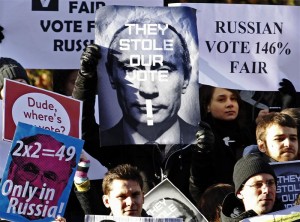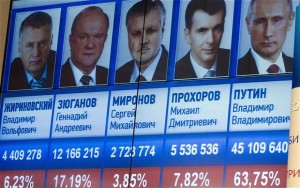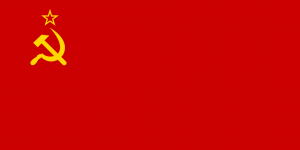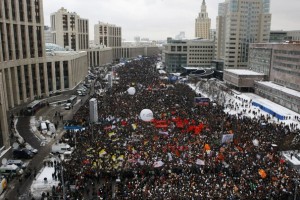Russian “Democracy”
Although Russia calls itself a democracy, there are not many democratic values that are a part of the Russian government. The very basic ideas of a democracy, free and fair elections, do not exist. While they do have elections, it is well understood that Russian elections are a sham. Vladimir Putin has been in power as Prime Minister or as President since 1999 after the unexpected resignation of President Yeltsin. Ever since there has never been any threat to his political power despite widespread discontent in Russia. From 2000 to 2008, he was president. Then from 2008 to 2012 he was Prime Minister and his right hand man Dmitry Medvedev was elected president. It was widely known that Putin held most of the power during this time. In 2011, following a change in the constitution to change the Presidential term from 4 to 6 years, he announced his third run for president. This sparked protests all over Russia but they achieved no success. He took over the Presidency in 2012 and has held power ever since. Every election has received criticism for blatant election fraud. For example, official results that were completely contradictory to the exit polls and pre-election opinion polls, employers pressuring workers to vote for Putin and stuffing ballot boxes. In the 2012 election, Elena Panfilova, the director of the Russian branch of Transparency International, reported a large mass of voters with absentee certificates — which allow you to vote outside your precinct — from faraway Tambov showing up at her precinct in suburban Moscow, where she worked as an observer. These absentee certificates were this election’s great innovation, giving the Kremlin armies of voters freed from their place of residence, and therefore making it impossible to make sure they only vote once.[1] These strategies are only some of the ways that the Putin regime keeps in power. In his book about Russian democracy, Robertson calls the Russian government a hybrid regime, combining democratic and authoritarian values and tactics.[2]

Russian residents in Britain demonstrate outside Britain’s Houses of Parliament in London December 10, 2011. REUTERS/Luke MacGregor
There has been much discussion among academics and politicians whether Russia can be called a “normal” country. As in be like the rest of the western democracies. In his book Ruling Russia, Zimmerman, Struggles with this question.[3] After the fall of the iron curtain in 1991, there was high hopes for the country to become a normal democracy. In his book about his hopes and dreams for the future of the country, Gorbechev actually named the first chapter “A Normal Country”. The problem with the term “normal” of course is that everyone has slightly different definitions of it. Russia’s new friends from the west defined it as a western style democracy while in Russia leaders saw normalcy as stability, security and the absence of change. In many ways this has defined Russia in the past two decades, which has been largely authoritarian rather then democratic. In Wilson’s book “Virtual Politics: Faking Democracy in the Post-Soviet World” he makes the case that Russia is not unique. He says most post-soviet states are not really democratic. Just like Russia they keep the veil of democracy through maintaining the traditions, like elections and opposition parties, but they really have no purpose in choosing the leaders. Russia has four key condition that keep the edifice of democracy standing. They have a powerful amoral elite, a passive electorate, a culture of information control and the lack an external counterpoint (foreign intervention). Together these conditions are mutually reinforcing.[4] Probably the most important to maintaining a passive electorate is through censorship or information control. Putin is skilled at maintaining the illusion of freedom of speech and freedom of press but in truth he has tight control over it.
Reflections of the Past
In order to understand the extent of Russian political censorship, one must look at its roots in communist values. During the era of communism there was strict laws against speaking out against the government and protesting the communist party. This instilled a tradition in Russian of a low demand for freedom of speech and the press. Just as in communist Russia, today the state controls most of the media, which severely limits what information the public is exposed to. While in communist Russia speech was severely more restricted and punishments were obviously harsher then a two-year prison sentence, there are certainly similar policies that exist today. During communism when there was dissidents that spoke out, the government would use the strategy to discredit them, so what they said had no value against the word of the state. Putin’s regime does this as well, they make their critics seem crazy and out of their minds. In the case of Pussy Riot, by convicting them as hooligans and religious haters, it framed the issue outside politics. Putin spoke about the women as if they were children behaving badly and that they simply hated the very basic values of the Russian culture.
In another way, the Pussy Riot affair is an example of the breaking down of Russian Political censorship. While the arrest and conviction was certainly censorship, it also backfired in that it gave the women a platform to spread their ideas about the injustices of the regime. During the trial and in Russian and western media, they were able to state their opinions and act as victims of the oppressive regime. Putin may have tight control over the state but this whole affair certainly showed cracks in his power. Prior to the “Punk Prayer” performance, there had been widespread discontent over the reelection of Putin and the obvious way that Putin manipulated the election. In December of 2011 there were huge protests in Moscow against Putin. In February of 2012, this incident spurred yet another outcry of protest against Putin, in calling for the release of the Pussy Riot members. In general when there is censorship, it causes more desire for what is being censored. Censorship gives more power to the censored action. It gives more reason to protest and fight. There are countless examples of this. In the U.S, where there is censorship it is just not so overt, there have been many examples of this in the past. Martin Luther King’s non-violent protests had a lot more political power when they were violently put down by the police rather then when they were allowed to march freely. The occupy wall street movement had a lot more power when there was resistance from political leaders and people were forced out of occupying. When there was no political resistance or effort to stop the protests, it largely went unnoticed and had very little political power. Theses are just some examples of so many all around the world.
[1] Adomanis, Mark. (2012). “How bad was the fraud in Russia’s Election?” Forbes.com.
[2] Robertson, G. (2011). The Politics of Protest in Hybrid Regimes: Managing Dissent in Post-Communist Russia. New York: Cambridge University Press.
[3] Zimmerman, William. Ruling Russia: Authoritarianism From The Revolution to Putin. 2014. Princeton University Press.
[4] Wilson, Andrew. (2005) Virtual Politics: Faking Democracy in the Post-Soviet World. Yale University Press.


